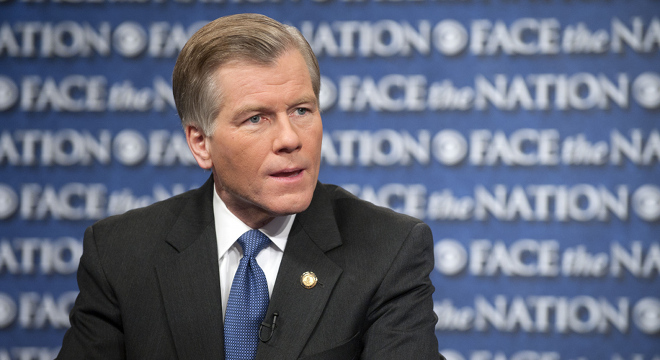It’s a sprawling, messy story. It involves the Virginia governor’s mansion, a wedding, undisclosed vacations, a “naturally-occuring alkaloid” called anatabine, a struggling company, a corporate jet, and, just to top things off, a chef facing embezzlement charges. But most importantly it involves Virginia Gov. Bob McDonnell (R), along with Virginia Attorney General Ken Cuccinelli.
The Washington Post on Monday and the Associated Press on Tuesday revealed that FBI agents are conducting interviews about the relationships between McDonnell, his wife Maureen, and Jonnie Williams Sr., a major McDonnell campaign donor and the chief executive officer of a company called Star Scientific, which makes an anti-inflammatory dietary supplement called Anatabloc. (Last month, the company disclosed that it was the subject of a federal securities investigation.)
According to the Post, FBI agents looking into the matter are trying to determine whether there was any quid pro quo between McDonnell and Williams. It’s a charge that is notoriously hard to prove. On Tuesday, McDonnell said his administration has never given any special treatment to Star Scientific. But news of the FBI’s interest has raised the profile of a story that’s been developing since late March, when the Post first reported on the “two-way” street between the governor and Williams.
Here are some of the story’s key facts and figures:
$15,000: Amount of money Williams reportedly paid to foot the bill for the food at the June 2011 wedding of Bob and Maureen McDonnell’s daughter Cailin. The wedding was held at Virginia’s Executive Mansion, and the menu featured poached jumbo shrimp, bruschetta, and stuffed chicken breast. McDonnell did not disclose the gift. A McDonnell spokesman told the Post in March that as the money was a gift to the governor’s daughter, and not to the governor, Virginia law did not require him to report it.
158: Miles between Smith Mountain Lake, southeast of Roanoke, Va., and Richmond, Va. In July 2011, the McDonnell family enjoyed a (disclosed) vacation at Williams’ Smith Mountain Lake house. According to the Post, they drove back to Richmond in Williams’ Ferrari.
$120,000: Publicly disclosed campaign donations given by Williams and Star Scientific to McDonnell and his political action committee.
3: Number of days before her daughter’s wedding that Maureen McDonnell spoke at a Florida seminar for scientists and investors interested in anatabine, the key ingredient in Anatabloc. According to the company, Anatabloc “leverages the body’s natural process for regulating its own inflammation using anatabine, a naturally-occuring compound found in some plants, combined with Vitamin A and D3 to help the body to avoid excessive creation of inflammation.” The dietary supplement is not regulated by the Food and Drug Administration. Anatabloc has received paid endorsements from golfer Fred Couples and tennis player John Isner.
$9,600: Reported value of food, lodging, transportation, and entertainment that McDonnell has disclosed receiving from Williams and his company in 2011 and 2012.
4: Embezzlement charges filed against Todd Schneider, a former executive chef at the Virginia governor’s mansion.
$4,500: Value of two stays at Williams’s Smith Mountain Lake vacation house that Cuccinelli disclosed on Friday. Cuccinelli had previously disclosed receiving nearly $13,000 in gifts from Williams and the company. One newly reported stay occurred over Thanksgiving in 2010. Williams also supplied a catered turkey dinner. According to the Post, Cuccinelli also failed to disclose that he owned stock in Star Scientific, which he attributed to an oversight. His 2012 disclosure form indicated that he held between $10,001 and $50,000 in Star Scientific stock, “the only company in which Cuccinelli has ever reported holding more than $10,000,” the newspaper reported.
$22.9 million: Amount of money Star Scientific reported losing in 2012, the company’s 10th consecutive money-losing year.
47th: Virginia’s rank in The State Integrity Investigation, a collaborative project of the Center for Public Integrity, Global Integrity, and Public Radio International.
“Virginia has long prided itself on ethical government, but the state’s lax oversight rules, weak consumer representation protections, dwindling capitol press corps and coziness between political and economic elites, have all combined to undermine the validity of that self-image,” the project’s Laura LaFay wrote, in a blog post explaining the reasons for the state’s low score. “Meanwhile, the few ethics and disclosure requirements that do exist tend to be flawed, limited or fraught with exemptions and qualifications, according to state ethics experts.”






